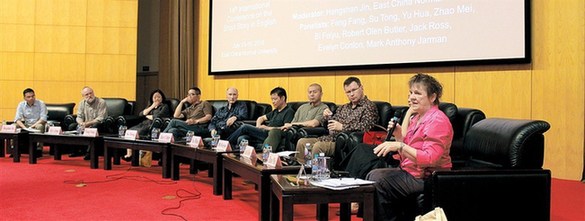Story event a tale of literary exploration
 0 Comment(s)
0 Comment(s) Print
Print E-mail Shanghaidaily.com, July 25, 2016
E-mail Shanghaidaily.com, July 25, 2016
At first glance, Shanghai might seem like an unlikely place to host an international conference on English-language short stories. Yet last week, more than 250 writers, scholars and translators from 30 countries turned up for just such an event, organized by the Society of the Study of the Short Story and held at venues around the city.
Attendees included English-language writers such as Clark Blaise, Robert Olen Butler, Gish Jen, Bharati Mukherjee, Evelyn Conlon and Yiyun Li. They were joined by a fleet of their Chinese peers, many of whom have had their works translated into English. The four-day conference included readings, workshops, book launches and panel discussions. It was also the first time the society has held such a conference in an Asian venue.
East and West
The conference's plenary meeting took place at East China Normal University and centered on the theme "Influence and Confluence in the Short Story: East and West." Writers from the Anglophone world were prompted by this theme to discuss the concepts of East and West as they relate to their own work and world literature as a whole.
Irish writer Evelyn Conlon, whose most recent work "Not the Same Sky" tells the story of three young women who were among the 4,000 orphaned Irish girls shipped to Australia following the Great Famine of 1847, said: "The West is a political concept rather than a place. For people from Ireland, we go East when we set sail for Australia. So, one must choose the borders or settings of the story carefully to make our writing vivid and precise."
Jack Ross, a New Zealand poet and lecturer in creative writing, said: "For years people thought we belonged to the West. However, the colonial and Maori history of New Zealand has made us neither East nor West. With increased immigration from Asian countries like China, Japan and Korea in the latter part of 20th century, the new generation of New Zealanders are eager to take on their own identities."
Mark A. Jarman, a Canadian writer who has traveled extensively in Ireland, the United States and Italy, said he's never worried about the East or the West when writing. However, "in Canada, those who write in English are isolated from those who write in French," he said. "That's why I like the idea of coming to meeting where English writers are meeting Chinese writers to break the barrier of the two solitudes."
The Chinese writers, meanwhile, spoke mainly on the influence of the Western tradition on modern Chinese literature.
Fang Fang, president of the Hubei Writers' Association, said: "Whereas classical Chinese literature developed almost independently of Western influence, modern Chinese literature drew heavily on it. It wasn't until after 1985 that modern Chinese literature started to have its own independent characteristics."
Recalling her own career in writing, Fang said her first novel was named after Guy de Maupassant's short story "Butterball."
"It was a Chinese story of typical characters, but it was my first time to explore the dark side of human nature. Shedding political ideologies and styles, the story was not able to be published at that time. However, to write about human nature has become the theme of my novels ever since," she said.
Su Tong, who is widely acknowledged as a master of short-form literature, gave credit to two American short stories — William Faulkner's "A Rose For Emily" and Carson McCullers' "The Ballad of the Sad Café" — which he said inspired him during his high-school years.
Aside from their vivid depictions of life in the American deep south, Su said his biggest take-away from these works is that: "the secret of writing a good story lies in its characters, in the lives of common men and women."
Zhao Mei, chairperson of the Tianjin Writers' Association as well as a writer of romance stories, said it was Virginia Woolf and Claire de Duras that led her to the feminist approach to literature. Bi Feiyu, winner of the Man Asian Literary Prize in 2010, said he's benefited greatly from Sigmund Freud's writings on the analysis of dreams, which he said gave him a "third eye" to see the world by intuition.
Globalization
When discussing the future development of the short story over the course of the conference, many writers expressed concern that globalization has led to a more homogenized world culture, where individual perspectives are becoming less unique. Yet, as Gish Jen asked at a separate book-talk event at Shanghai Library, why write fiction at all "when reality today can be much more interesting than any novel?"
Jen is a second generation Chinese-American whose works focus on immigrants experiencing the triumphs and trials of American life.
For other writers though, the interchange between world cultures is also allowing for new experiences and ways of living. Author Clark Blaise, for example, was born in American to an English mother and a French father and now lives with his Indian-born wife in Canada. Blaise said it took him more than 50 years to develop the confidence to write about many important aspects of the modern world, despite his own experiences with globalizing forces.
American fiction writer Robert Olen Butler, who won the Pulitzer Prize in 1993 for "A Good Scent From a Strange Mountain" — a collection of short stories about the aftermath of the Vietnam War — told reporters at the conference that writing is "always a form of human yearning in search for self-identity."
Though different writers used different ways to express themselves, the writers all seemed to be in agreement that good stories from outsider perspectives can increase our capacity for empathy and inspire readers to see their world in a whole new light.







Go to Forum >>0 Comment(s)